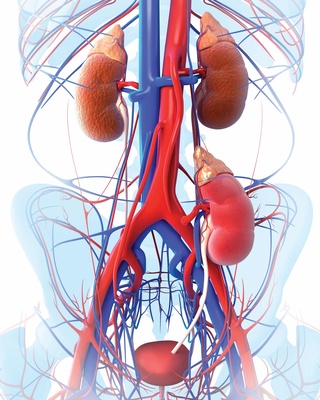Kidney Transplant
“For me, transplant was the answer and I’ve been blessed with so very few problems from my two transplants over the past 24 years that I wouldn’t even bother listing them.” John L.
“I never left the hospital with my first transplant. A second one lasted 23 months. The 3rd never fully worked and I stayed on and off dialysis for a year until it quit. The last one never worked and was taken out because it caused fevers and pain. But, I am still here!” Elaine V.


For a transplant, a surgeon will put a healthy kidney in your body. The new kidney will go in your belly, tucked into your pelvis. (In most cases, your own kidneys will stay in your body, too.) One new kidney will do most of the work of your two failed ones.
You need to pass many medical tests to be able to get a transplant. These tests will see if your body can handle the stress of a long surgery. They will also make sure you are healthy enough to take drugs to suppress your immune system so you don’t reject the new kidney.
 Watch our 2 minute video on Kidney Transplant.
Watch our 2 minute video on Kidney Transplant.
Transplant and Your Lifestyle
A transplant is not a cure. You will still have kidney disease. But, if a transplant works well, your lifestyle may be a lot like it is now:
- You may feel well enough and have the energy to work
- Travel is easy, since you don't have to set up dialysis
- Your schedule will not have to change, except for doctor visits
- You can eat and drink without strict limits (a low salt, healthy diet is advised)
- You may sleep well at night
- Women who have had transplants can have healthy babies
Transplant Medicines

Your body can reject a new kidney at any time—even years down the road. It may feel like the new kidney is now part of you. But, it is “foreign” to your immune system. The closer the match of a new kidney to your own blood and tissues, the fewer medicines you may need. Like any medicines, transplant drugs can cause side effects:
- In the short term, you may have stomach upset, diarrhea, mood swings, or strange dreams. Weight gain, swollen gums, or a puffy “moon” face can occur. Hair may grow where you don’t want it. If you have these problems, they tend to get much better once your body gets used to the drugs. Your doses are reduced after a few weeks, and this can help, too.
- In the long term, transplant drugs suppress your immune system and raise the risks of cancer and diabetes. The cancer risk is mostly for skin cancer. Staying out of the sun and using sunscreen can help lower this risk.
Each transplant center uses a different mix of drugs. Talk to your center about the drugs you would take and their side effects.
Most transplants work well for 5 to 11 years or so—and some last for decades. As the medicines get better, more kidneys may last longer. But, a few new kidney transplants never work at all. Others fail after weeks or months. There are no guarantees. If a transplant fails, you can still do dialysis, either for good or until you get another kidney. Some people have had as many as four transplants.
Where Kidneys Come From

Kidneys for transplant come from two types of donors:
-
Deceased donors — Some kidneys come from people whose families donate their organs after brain death. It can be a great comfort when something good comes out of the tragic loss of a loved one. If you have type 1 diabetes you may be able to get a kidney and pancreas transplant (KP). Some centers will do KPs for people with type 2 diabetes who use the hormone that controls blood-sugar levels. When this works, you no longer need injections, or dialysis. And, when you need two organs, you may get a transplant faster. If both organs come from the same donor, you may need less medicine than if you had two donors.
-
Living donors — A healthy living person can donate a kidney. Most living donors are relatives. But, neighbors, friends, and even strangers can donate. If someone is willing to donate, but is not a blood or tissue match for you, you may be able to trade donors. In a paired donation, your donor gives a kidney to someone else who needs one. Then his or her donor gives a kidney to you. All of the transplants are done on the same day so no one backs out. Some “chains” of paired kidney donation have helped dozens of people. Living donor kidneys tend to last longer than deceased donor kidneys.

Things for you to think about with both kinds of donor
| Deceased Donor | Living Donor |
|---|---|
| How to get one | |
|
The United Network for Organ Sharing (UNOS) runs the U.S. program that oversees who gets kidneys from deceased donors. You must go to a transplant center and have many tests done to be on the list. Getting on the list is not automatic. But, when you get on the list, you get credit for the time you wait. |
You must go to a transplant center and have tests. You will need to tell people you know about your kidneys. When you do, one or more may offer to be tested—or not. Not wanting to be tested may be due to fear of pain or surgery. Or, they may not be able to lose the month it takes to recover. Someone can love you and not offer you a kidney. |
| How long it takes | |
|
Once on the list, your wait may be just days or weeks, but most people wait years. Just over half of the people on the list for a kidney have waited at least 2 years. The wait time depends on your blood type. You can be listed at more than one transplant center, if they are in different states and you can get there quickly if they call you. |
A living kidney transplant can go quite quickly after all of the tests are done. You can schedule the transplant at a time that works for you and your donor. If you don’t have people who can or will donate, it can take time to find a donor. Some people have found success through Facebook, billboards, and other creative ways. |
| Risks | |
|
You may not know much about a deceased donor and his or her health history. A donor may have a virus you could catch, or a hidden cancer. |
Most donors do well. In the short term, all surgery has some risk. In the long-term, there are few studies. A 2013 study of donors from Norway followed for 15 years or more found a 30% higher risk of donor death 10+ years later. (The risk was still quite small.) The study was of donors vs. healthy people—not just the general public. Donors also had 11 times more risk of kidney failure 10+ years later (still a small number).* If you get a living donor kidney and it does not work or fails quickly, this can be heartbreaking for you both. *Of 1,901 donors, nine had kidney failure 10 to 24 years later. All were family members. |
What to Expect After a Transplant
Right after a transplant, you will be in intensive care. You may stay in the hospital for a week or two. It can take time for a new kidney to “wake up” and work. If the kidney works, you will not need dialysis. You may need biopsy tests to see how the kidney is doing. You may take new medicines. The doses may need to change based on your test results. You might need plasmapheresis to clean antibodies out of your blood that could harm the new kidney.
Once you are home, you will need to have frequent blood tests to check on your kidney. A healthy lifestyle can help you keep your new kidney working. It is vital not to smoke. People who smoke after a transplant are much more likely to have it fail. Eat a healthy, balanced diet. Drink lots of fluids. Stay active. Wash your hands or use hand sanitizer so you don’t catch colds or other infections. If you want to have a baby, your doctors may want you to wait for one year.
To Learn More About Transplant
- Watch How to Have a Good Future with Kidney Disease: Transplant
- Visit Kidney School module 2 - Treatment Options for Kidney Failure
- Watch our 2 minute video on Kidney Transplant.

